The Hare and the Tortoise
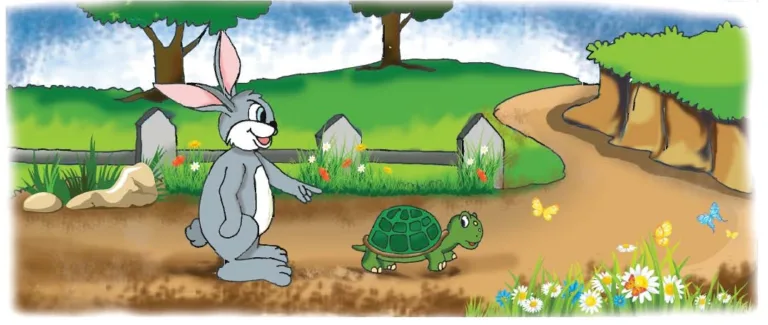
Once, there was a hare who was best friends with a tortoise. The hare was very proud of how fast he could run, so one day, he challenged the tortoise to a race. The tortoise agreed, even though everyone thought he was way too slow to win. The race began, and the hare raced so fast that he was far ahead of the tortoise.
Feeling confident, the hare decided to take a nap under a tree while the tortoise kept going, step by step. When the hare woke up, he was shocked to see the tortoise crossing the finish line. The tortoise had won the race!
Moral of the story: It doesn’t matter how fast or strong you are—what matters is being steady and never giving up. And don’t be too proud, it can cause trouble!
Overconfidence will often be punished by embarrassing failure.
The Dog and the Bone

One day, a dog found a big, tasty bone. He was so excited that he grabbed it and ran to find a quiet spot to chew it in peace. While crossing a river, he looked down and saw his reflection in the water. But the silly dog thought it was another dog with another bone! Greedy for more, the dog barked to snatch that “other” bone. But as soon as he opened his mouth, his own bone dropped into the water and sank. The poor dog lost it all and had to go home with nothing.
Moral of the story: If you’re too greedy and always want more, you might lose what you already have.
The Elephant and the Ants
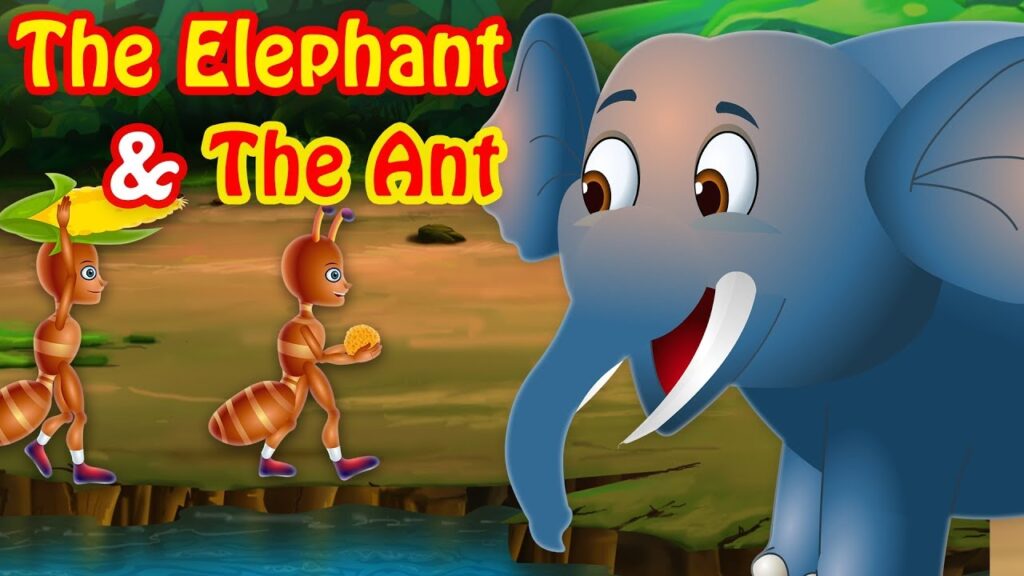
A big, proud elephant loved bullying smaller animals. Every day, he sprayed water at the ant hill, making life difficult for the tiny ants. One day, the ants decided to teach him a lesson. They crawled into his trunk and started biting him from the inside! The elephant danced and howled in pain until he begged for forgiveness. He promised to never hurt the ants or anyone else again.
Moral of the story: No one is too small to make a difference. Be kind to everyone, no matter how big or small they are.
The Fox and the Grapes

A hungry fox was walking past a vineyard when he saw some ripe, juicy grapes hanging from a vine. They looked so delicious! The fox jumped high to grab them but couldn’t reach them, no matter how hard he tried. Tired and frustrated, the fox walked away, grumbling, “Those grapes are probably sour anyway!” But deep down, he knew he had just given up too quickly.
Moral of the story: Don’t make excuses when something is hard—keep trying!
Lazy John
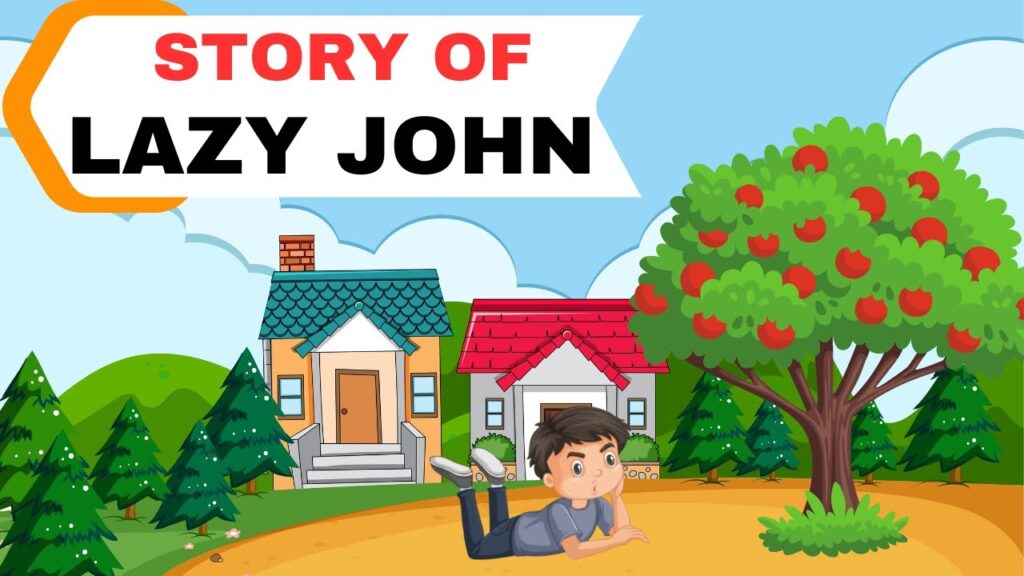
There was a boy named John, and he was the laziest boy in the entire town. One day, John saw their apple tree full of shiny red apples. He wanted to eat some but was too lazy to climb the tree. Instead, he lay on the grass and waited for the apples to fall down on their own. But, of course, the apples didn’t fall, and soon John was very, very hungry because he hadn’t worked for his food.
Moral of the story: Laziness won’t get you anywhere. You have to work hard to get what you want!
The Ant and the Grasshopper
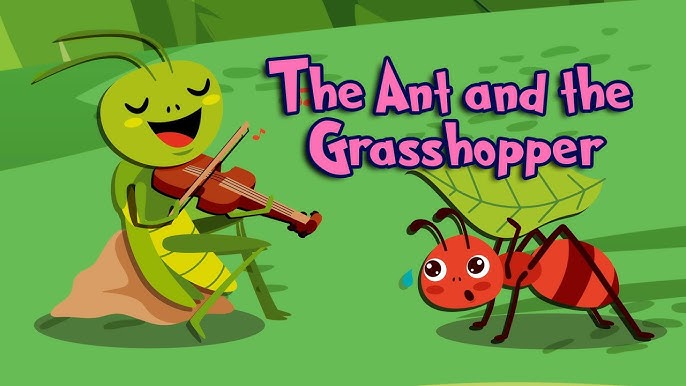
One summer, an ant worked hard every day to gather food and store it safely for the winter. His friend, the grasshopper, however, laughed and said, “You work too hard! Relax!” The grasshopper spent all summer playing and singing instead of preparing.
But when winter came, the grasshopper was cold and hungry, while the ant stayed cozy in his home with more than enough food.
Moral of the story: Always plan ahead and be prepared. Life won’t always be easy, so take care of your needs while you can.
The Boy Who Cried Wolf Moral Story
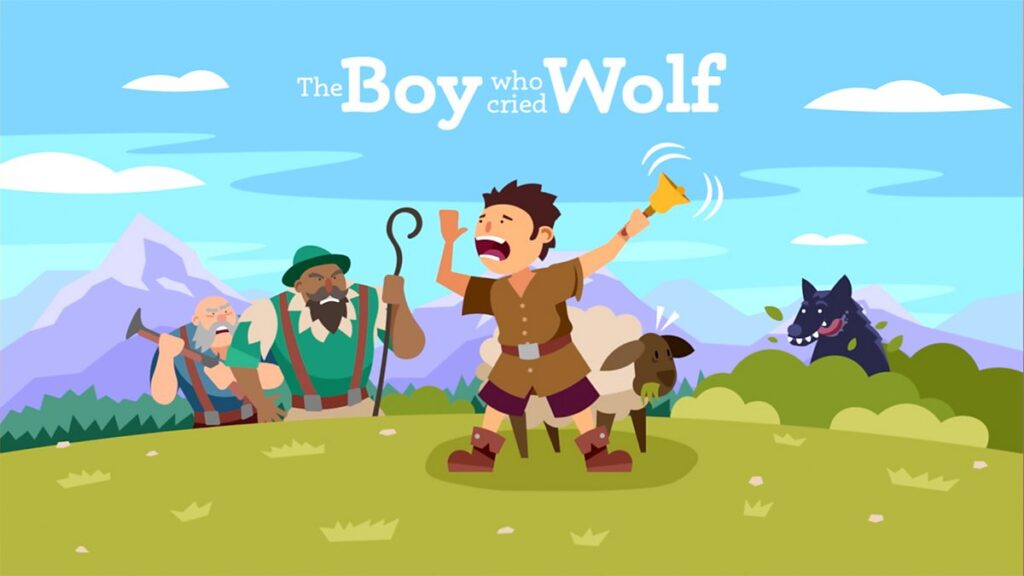
There was a young boy whose job was to watch over the village sheep. One day, he was bored and wanted some fun, so he shouted, “Wolf! Wolf!” The villagers came running to help, only to find the boy laughing at them because there was no wolf. The next day, he did it again, and the villagers were angry. Later, a real wolf came and started attacking the sheep. The boy cried, “Wolf! Wolf!” But this time, no one believed him, and the wolf ran off with some sheep.
Moral of the story: If you keep lying, no one will trust you—even when you’re telling the truth!
Thirsty Crow
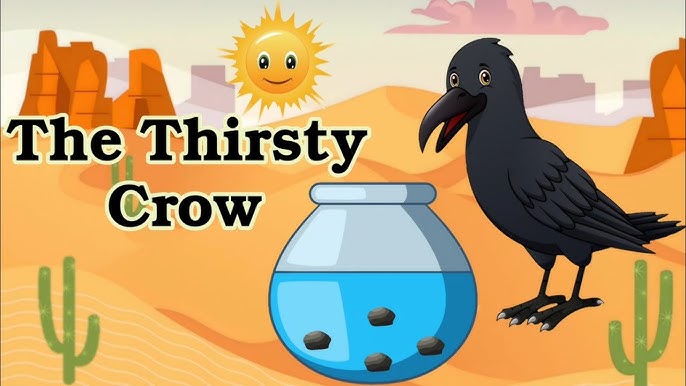
A thirsty crow was flying through a forest, looking everywhere for water. Finally, he saw a pot with some water at the bottom, but his beak couldn’t reach it. The crow didn’t give up. He looked around and noticed some pebbles on the ground. The clever crow started dropping the pebbles into the pot one by one. Slowly, the water rose higher and higher until it was close enough for him to drink. The crow finally quenched his thirst and flew away happily.
Moral of the story: You can solve any problem if you think smart and don’t give up!
The Weight of Soil

There was a very clever and cunning landlord who owned a large portion of land in an entire village. He would slyly lend small amounts of money to those in need who came to him for help. Taking advantage of the fact that many were not well-educated, he kept adding interest to the principal amount. Eventually, the repayment would increase so much that people couldn’t pay it back and ended up surrendering their land to the landlord.
Now, his eyes were on a piece of land owned by an old lady who lived near his house. She was all alone, with no family. She planted her own crops and lived a self-sufficient life. The landlord couldn’t figure out how to deceive her into giving up her land. So, he bribed a government official in the village and forged ownership papers in his name. Together with the official, he visited the old lady and served her a notice to hand over the land to him.
The old lady was shocked to hear this and pleaded, saying she had been living there her entire life. The land had been owned by her ancestors, her loved ones were buried there, and she had inherited it. “How can someone suddenly claim this land now?” she asked. She approached the local court, but the landlord had bribed everyone and presented the forged papers. As a result, the court delivered a judgment in the landlord’s favor.
Heartbroken, the old lady began preparing to vacate the land while the landlord and his associates stood watching, waiting for her to leave. With tears in her eyes, she approached the landlord and said,
“Sir, you have taken everything from me today. My entire life was spent here, but now I must leave. This is the land where I played, grew up with my family, and this soil is very dear to me.”
She added, “We all are made of soil, and so it’s natural to feel an attachment to it. Please allow me to take a basket filled with this soil with me. With that by my side, I’ll always have the scent of this place until I die peacefully.”
The landlord smirked. Since he had already taken her entire land without paying a rupee, he thought he might as well let her take a basket of soil so she would leave quietly. He said, “Fine. You can fill your basket.”
The old lady began filling her basket with soil. She overfilled it and struggled to lift it over her head. She then said to the landlord,
“Sir, will you please help me lift this basket onto my head?”
The landlord stepped forward to assist and said,
“Oh, you poor old lady! Didn’t you think before overfilling this basket? You can’t even carry this soil—how will you take it with you?”
With tears in her eyes, the old lady replied,
“Sir, this entire land was mine. I spent my whole life here. Yet, while I’m still alive, I cannot carry even a single basket of soil with me. I won’t be able to take it with me when I die either. You, sir, have taken so much land from others—how will you carry all of it with you?”
The landlord stood stunned. He realized his mistake and fell at the old lady’s feet, begging for forgiveness. He asked her to continue living there happily and returned her land.
Moral: Do not cheat, and don’t be greedy. Do not take more than you need. Be content with what you have—sometimes, it is enough for a happy life.
Tenali Rama and the Trader
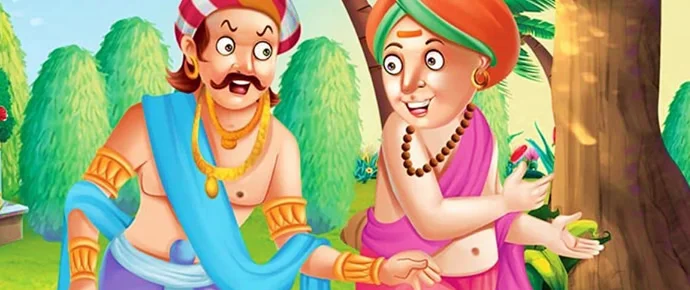
King Krishnadevaraya loved horses and had a collection of some of the best breed of horses in his stable. Once a horse trader from Arabia came to the court of Krishnadevaraya and told him that he had some very good breed of Arabian horses for sale. He invited the King to see the horse that he had brought with him and told him that if he liked it, he would send for the other horses too.
The King loved the horse and told him that he would like all his horses. The King paid him 5000 gold coins as an advance, and the trader promised that he would return with the other horses in 2 days before leaving.
Two days passed by, then two weeks and still, the trader did not return. The King got more and more anxious. One evening, to relax his mind, he went to take a stroll in the garden. There he saw Tenali Raman writing down something on a paper. The King went up to him and asked what he was writing. He did not get an answer. The King further quizzed him. Tenali then looked up and told the King that he was writing down the names of the biggest fools of the Vijayanagar Kingdom.
The King took the paper from him and saw his name written at the top. He was furious with Tenali and asked for an explanation. To that Tenali replied that any man who gives away 5000 gold coins to a total stranger is a fool. The King then asked Tenali what if he returned with the horses; to which Tenali said then, in that case, that man would be a fool. He would then write down the trader’s name instead of the king’s.
Moral: Do not believe in strangers blindly. The same goes when you do your business with anyone.
A King’s Painting
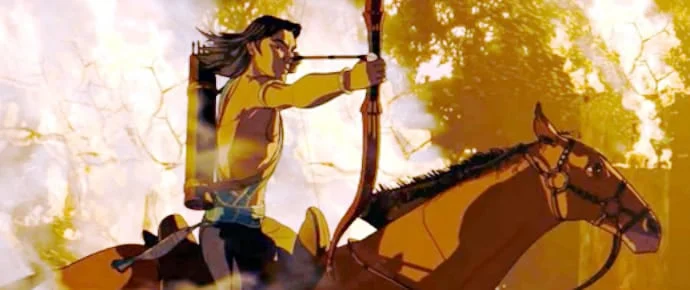
Once upon a time, there was a Kingdom. The king there only had one leg and one eye, but he was very intelligent and kind. Everyone in his kingdom lived a happy and a healthy life because of their king. One day the king was walking through the palace hallway and saw the portraits of his ancestors. He thought that one day his children will walk in the same hallway and remember all the ancestors through these portraits.
But, the king did not have his portrait painted. Due to his physical disabilities, he wasn’t sure how his painting would turn out. So he invited many famous painters from his and other kingdoms to the court. The king then announced that he wants a beautiful portrait made of himself to be placed in the palace. Any painter who can carry out this should come forward. He will be rewarded based on how the painting turns up.
All of the painters began to think that the king only has one leg and one eye. How can his picture be made very beautiful? It is not possible and if the picture does not turn out to look beautiful then the king will get angry and punish them. So one by one, all started to make excuses and politely declined to make a painting of the king.
But suddenly one painter raised his hand and said that I will make a very beautiful portrait of you which you will surely like. The king became happy hearing that and other painters got curious. The king gave him the permission and the painter started drawing the portrait. He then filled the drawing with paints. Finally, after taking a long time, he said that the portrait was ready!
All of the courtiers, other painters were curious and nervous thinking, How can the painter make the king’s portrait beautiful because the king is physically disabled? What if the king didn’t like the painting and gets angry? But when the painter presented the portrait, everyone in the court, including the king, left stunned.
The painter made a portrait in which the king was sitting on the horse, on the one-leg side, holding his bow and aiming the arrow with his one eye closed. The king was very pleased to see that the painter has made a beautiful portrait by cleverly hiding the king’s disabilities. The King gave him a great reward.
Moral: We should always think positive of others and ignore their deficiencies. We should learn to focus on the good things instead of trying to hide weaknesses. If we think and approach positively even in a negative situation, then we will be able to solve our problems more efficiently.
Seek a Revenge or give Forgiveness
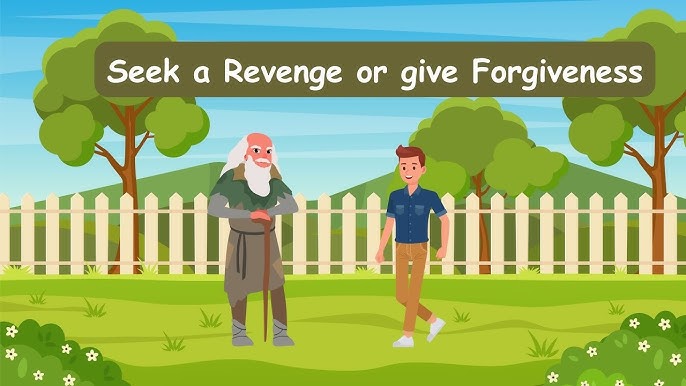
Once upon a time, there was a wise old man who lived in a small village. He was known throughout the land for his wisdom and his ability to solve any problem that came his way.
One day, a young man came to the wise old man and said, “I have a problem. I have been wronged by someone and I want revenge. What should I do?”
The wise old man replied, “Before you seek revenge, you should ask yourself if it is worth it. Revenge may make you feel better in the short term but it will not bring you true happiness.”
The young man thought about this for a moment and then asked, “But what if I don’t seek revenge? Won’t people think that I am weak?”
The wise old man replied, “True strength comes from within. It takes more courage to forgive than it does to seek revenge. If you can find it in your heart to forgive those who have wronged you, you will find true happiness.”
The young man thought about this for a moment and then thanked the wise old man for his advice. He left the village feeling much better than he had before.
Moral: Forgiveness is a sign of true strength and courage. It takes more courage to forgive than it does to seek revenge.
The Honest Woodcutter
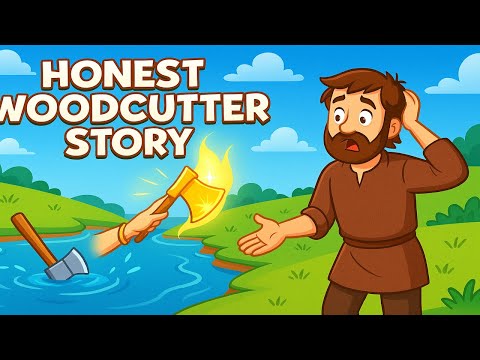
A poor woodcutter dropped his axe into a river. When he prayed for help, a river spirit appeared with a golden axe and asked if it was his. The woodcutter, though tempted, said no. The spirit then brought out a silver axe, but again, the woodcutter refused. Finally, the spirit returned his old iron axe. Impressed by his honesty, the spirit rewarded him with the gold and silver axes too.
Moral: Honesty is the best policy.
The Golden Touch
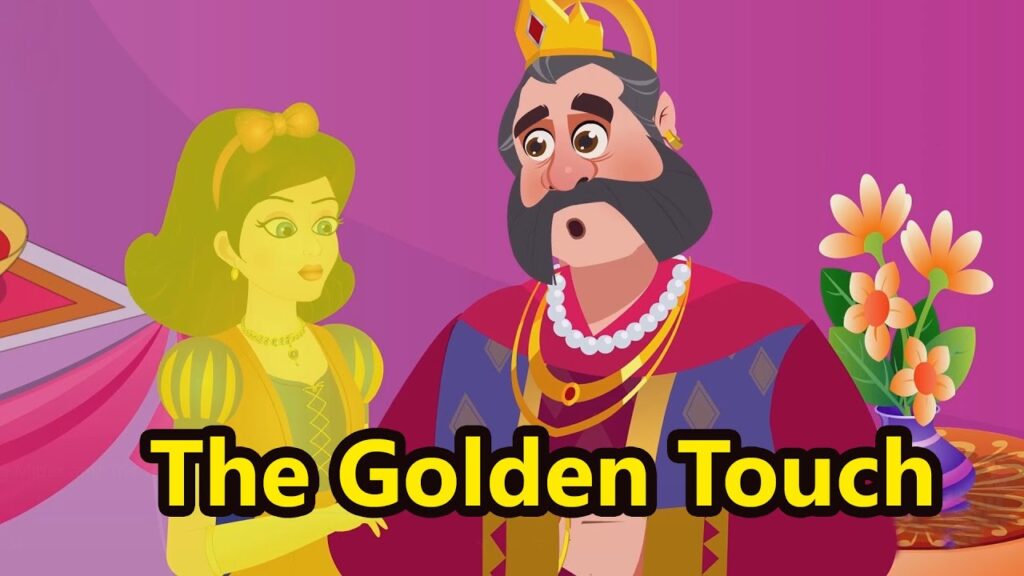
Midas, a character from Greek mythology and Roman folklore, ruled over Phrygia and was famous for his greed and lack of wisdom. After showing kindness to Silenus, Midas was granted a wish by Dionysus. The king wished that everything he touched would turn into gold.
At first, he was thrilled with his new power, but soon he faced the consequences when even his food transformed into gold, leaving him on the brink of starvation. This experience made him realise the errors of his ways.
Moral of the Story: Greed will always lead to your downfall.
The Rose and the Cactus
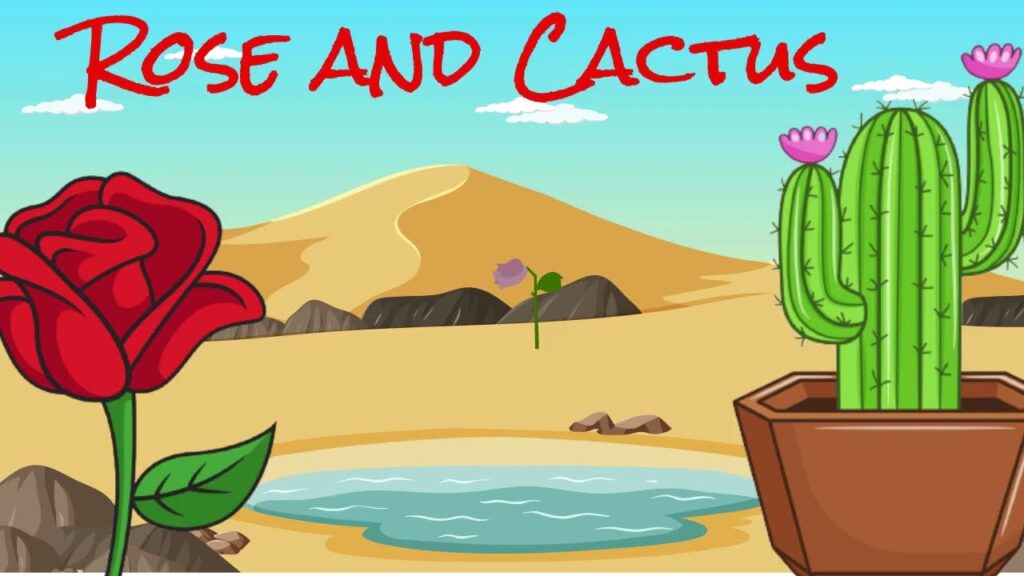
There was once a rose that took great pride in her stunning appearance. The only thing that bothered her was that she grew next to an unattractive cactus. Almost every day, the rose would make fun of the cactus’s looks. But the cactus remained silent. Other plants, flowers, and trees nearby tried to intervene and stop the rose from bullying the cactus. But she was proud of her own beauty.
As spring faded and summer came, the rain stopped falling for a long time. The once vibrant rose began to lose her colour and started to fade. One day, she noticed a sparrow pecking at the cactus to drink some water. Feeling embarrassed, the rose hesitated to ask the cactus for help, but eventually, she did. The generous cactus agreed, and the sparrows came to water the rose.
Moral of the Story: Never ridicule anyone based on their looks.
The Ugly Duckling
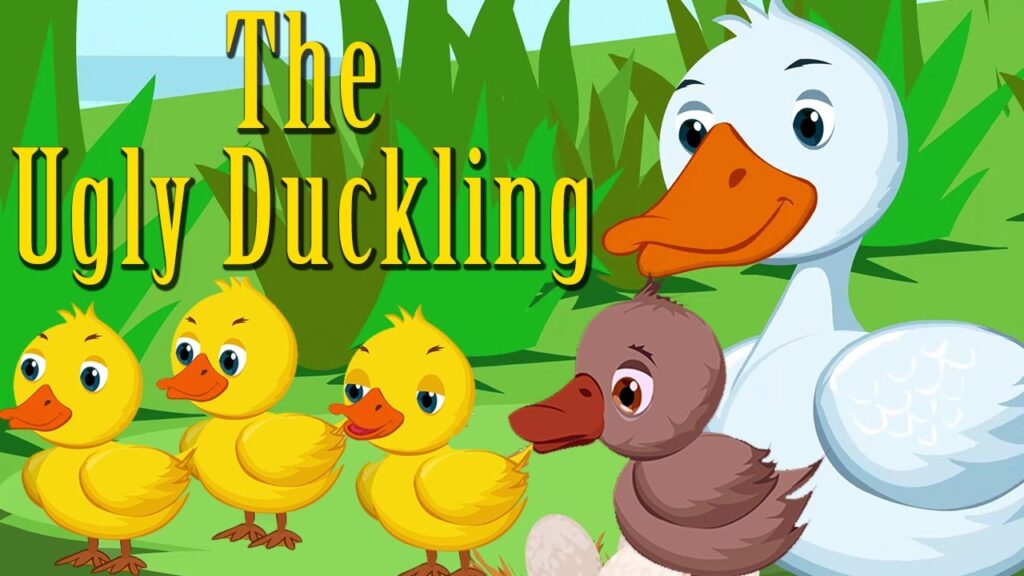
A little duckling was born looking very different from his siblings. The other ducklings called him ugly and made fun of him. Feeling like he didn’t belong, the little duckling ran away and searched for a place where he could be accepted. Seasons passed, and one day, he saw his reflection in a lake. To his surprise, he had grown into a beautiful swan! He wasn’t an ugly duckling at all—he had just been different all along.
Moral of the story: Don’t judge someone by how they look. Everyone is special in their own way, and real beauty is about being yourself.
The Milkmaid and Her Pail
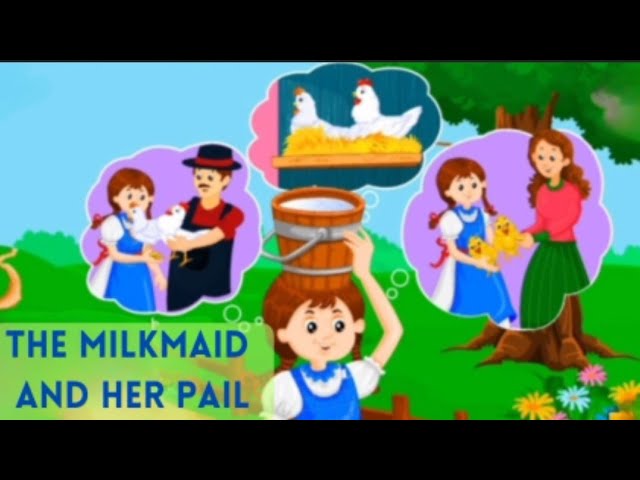
The Milkmaid had just finished milking the cows and was on her way back from the field with the shiny milk pail on her head. She was lost in thoughts about her future plans as she strolled along.
She thought that the milk would give her a good amount of butter to churn. She will sell that and use the money to buy a bunch of eggs for hatching. When May day arrives, she could sell the chickens hatched from eggs and buy a beautiful new dress from the money earned.
Lost in her thoughts, she arrogantly tossed her head, causing the milk pail to tumble to the ground. The milk spilled out, taking with it the butter, eggs, chicks, new dress, and all the milkmaid’s pride.
Moral of the Story: Don’t count your chickens till they’re hatched.
The Wise Old Owl
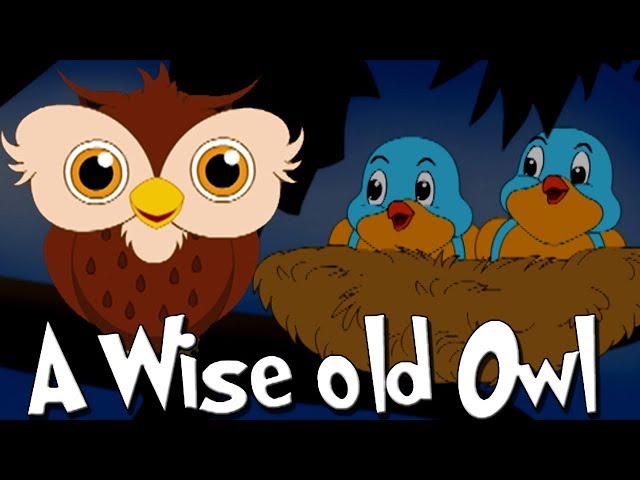
There was an old owl who lived in an oak tree and she saw many things happening around her every day.
One time, the owl saw a boy helping an old man carry a heavy basket.
Another time, the owl saw a little girl yelling at her mother. The old owl saw a lot of things every day, but she never said anything about what she saw.
As time went on, the owl started to talk less and less, but this made her hear better. Now the owl could hear what people were saying as they walked by the trees.
One day, she heard a woman telling someone else that she saw an elephant jumping over her fence. Another day, the owl heard a young man bragging to someone else that he was perfect and never made mistakes in his life.
Every day, the old owl spoke less and listened more. Slowly, she became wiser and was known as the wise owl.
Moral of the Story: Speaking less and listening more makes you wiser.
The Golden Egg
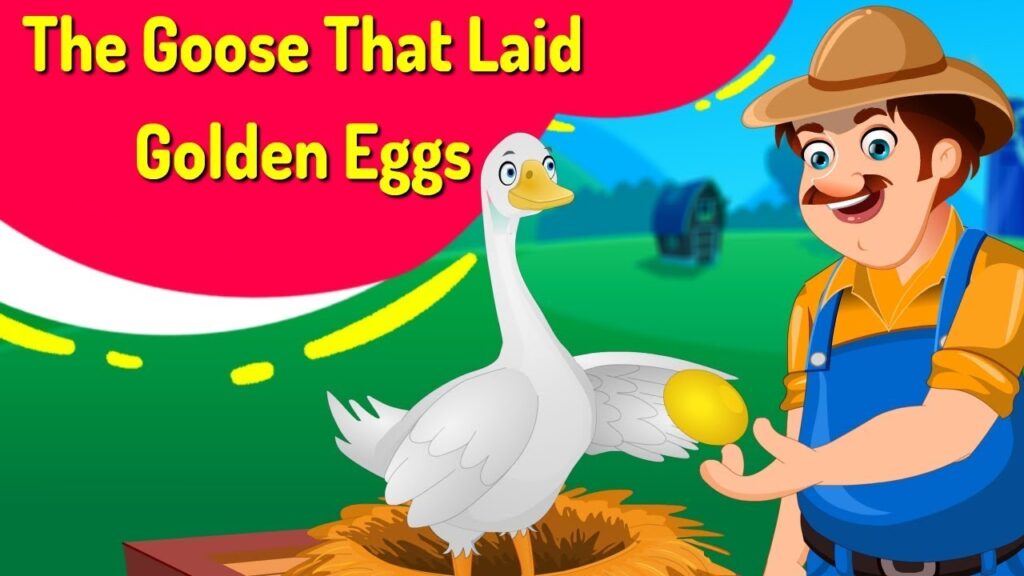
Once upon a time, there lived a cloth merchant in a village with his wife and two children. They were indeed quite well-off. They had a beautiful hen which laid an egg every day. It was not an ordinary egg, rather, a golden egg. But the man was not satisfied with what he used to get daily. He was a get rich-trice kind of a person.
The man wanted to get all the golden eggs from his hen at one single go. So, one day he thought hard and at last clicked upon a plan. He decided to kill the hen and get all the eggs together.
So, the next day when the hen laid a golden egg, the man caught hold of it, took a sharp knife, chopped off its neck and cut its body open. There was nothing but blood all around & no trace of any egg at all. He was highly grieved because now he would not get even one single egg.
His life was going on smoothly with one egg a day but now, he himself made his life miserable. The outcome of his greed was that he started becoming poorer & poorer day by day and ultimately became a pauper. How jinxed and how much foolish he was.
Moral: One who desires more, loses all. One should remain satisfied with what one gets.
The Dreaming Priest
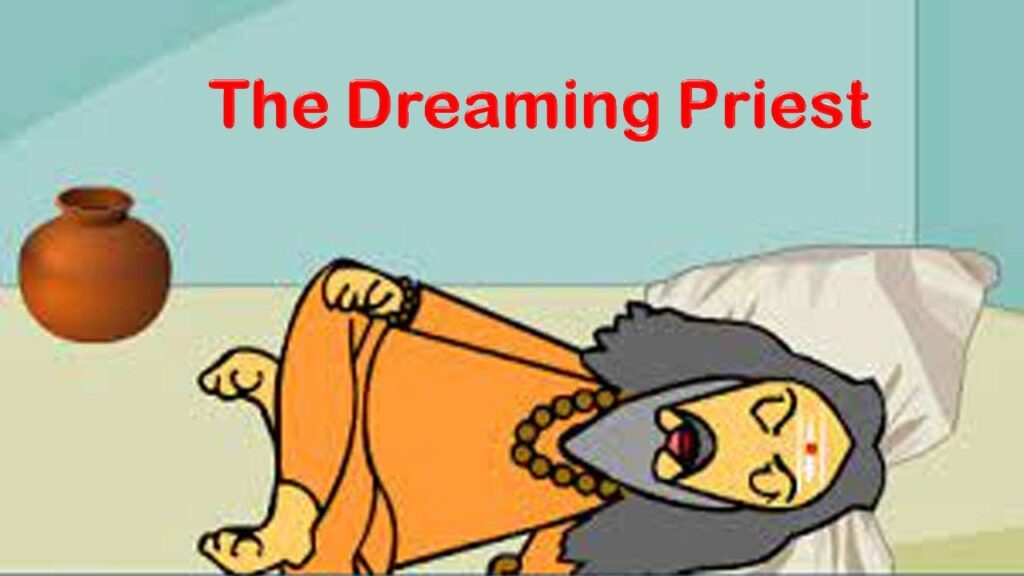
Long time ago there lived a priest who was extremely lazy and poor at the same time. He did not want to do any hard work but used to dream of being rich one day. He got his food by begging for alms. One morning he got a pot of milk as part of the alms. He was extremely delighted and went home with the pot of milk. He boiled the milk, drank some of it and put the remaining milk in a pot. He added slight curds in the pot for converting the milk to curd. He then lay down to sleep.
Soon he started imagining about the pot of curd while he lay asleep. He dreamed that if he could become rich somehow all his miseries would be gone. His thoughts turned to the pot of milk he had set to form curd. He dreamed on; “By morning the pot of milk would set, it would be converted to curd. I would churn the curd and make butter from it. I would heat the butter and make ghee out of it. I will then go to that market and sell that ghee, and make some money. With that money i will buy a hen. The hen will lay may eggs which will hatch and there will be many chicken. These chicken will in turn lay hundreds of eggs and I will soon have a poultry farm of my own.” He kept on imagining.
“I will sell all the hens of my poultry and buy some cows, and open a milk dairy. All the town people will buy milk from me. I will be very rich and soon I shall buy jewels. The king will buy all the jewels from me. I will be so rich that I will be able to marry an exceptionally beautiful girl from a rich family. Soon I will have a handsome son. If he does any mischief I will be very angry and to teach him a lesson, I will hit him with a big stick.”During this dream, he involuntarily picked up the stick next to his bed and thinking that he was beating his son, raised the stick and hit the pot. The pot of milk broke and he awoke from his day dream.
Moral: There is no substitute for hard work. Dreams cannot be fulfilled without hard work.


